best buys
The best car seats for newborns 2022
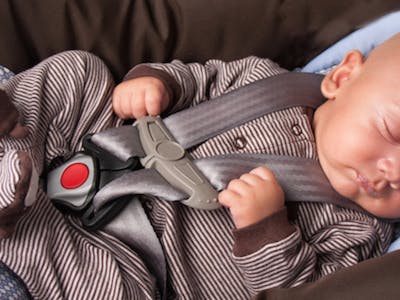
This page contains affiliate links, which means we may earn a small amount of money if a reader clicks through and makes a purchase. All our articles and reviews are written independently by the Netmums editorial team.
You’ll need a car seat to transport your baby home from hospital and to keep them comfortable and secure on journeys in the car, so it’s one of the most important purchases you’ll make as a parent.
It’s illegal to travel by car unless your baby is in an age-appropriate car seat, as it offers vital protection in case of an accident.
And, even if you don’t drive or have your own car, you should still have a car seat for journeys in other people’s cars.
An infant car seat that can attach to a pushchair to form a travel system will give you greater flexibility, too.
You’ll also appreciate a car seat that's compact, simple to install and – important where babies are concerned – easy to keep clean!
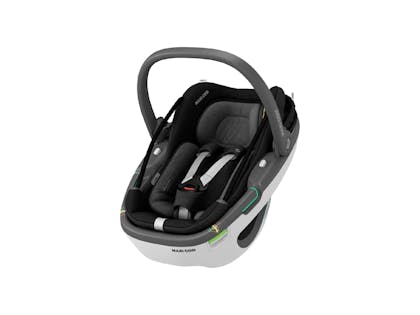
1. Maxi-Cosi Coral, £239
*Innovative newborn car seat
*Comes with removable baby seat
*Weighs just 1.7kg
This innovative car seat from the well-respected Maxi Cosi brand turns into a baby seat and can also be used on a pushchair chassis as a travel system.
Its innovative two-part modular system consists of an ‘outer’ car seat shell with a detachable ultra-light ‘inner’ carrier complete with retractable straps.
With sleek and futuristic looks, the Coral is suitable for your baby's first year and has other great features such as Isofix connectors and an extra-large sun canopy.
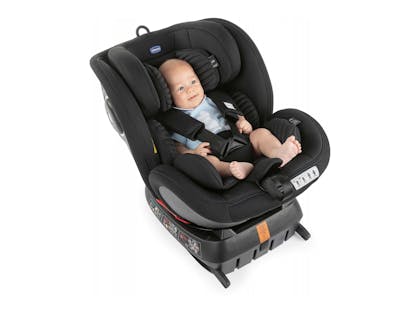
2. Chicco Seat 4 Fix, £269
* Suitable from birth to around 12 years old (36kg)
*Fits with top tether, Isofix or seatbelt
*Several recline positions
Not only does this versatile seat carry your child for the first 12 years, it's also packed with lots of features to help with comfort and safety.
It boasts a convertible seat that grows as your child does, with a 360 degree spin for ease.
It's rearward facing until your baby reaches 18kg with a five-point harness for added safety and peace of mind.
There are four different recline positions for children of every age and it's made from breathable fabric with a sun canopy for added comfort in warm weather.
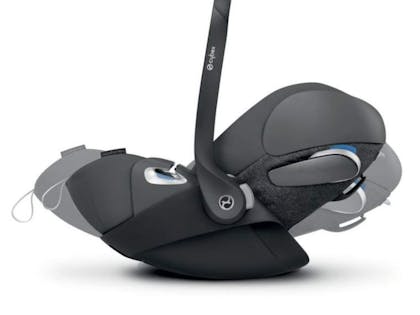
3. Cybex Cloud Z, £239
*Gives an ergonomic lie-flat position when used outside the car
*There’s a removable newborn inlay for premature and very small babies
*Has a 11-position height-adjustable headrest
Designed with your baby's comfort and safety in mind, this from-birth car seat by German baby brand Cybex has a fully reclining backrest and a side-impact protection system, plus a super-tough energy-absorbing shell, which will absorb any force in the event of collision.
To make it easier to get your child in and out of the car, the seat can even be swivelled to face your car door, thanks to the innovative Base Z rotation mechanism.
It also comes with a sensor that will alert you if your child undoes the buckle or starts to become too hot in the back of the car.
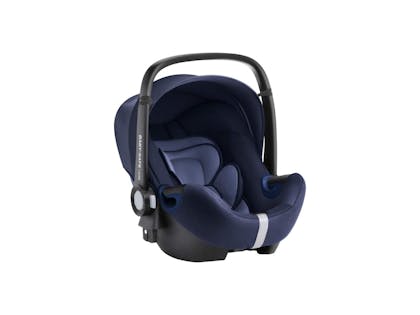
4. Britax Baby Safe i-Size, £200
*Is designed in line with the latest i-Size safety regulations
*Five-point harness and side impact protection
*Compatible with Isofix base for added security
This latest version of Britax's award-winning Baby Safe car seat complies with the latest i-Size regulations and can also lie flat for your baby's health.
The Baby-Safe has an adjustable handle and headrest and can be attached to a range of compatible Britax pushchairs with the Click 'n' Go system.
The patented lie-flat technology means that the seat adjusts as you move the headrest, so you can always be sure that your child is in the safest and most comfortable position.
Suitable from birth, the Baby-Safe will fit children until around 12-15 months old or 13kg.
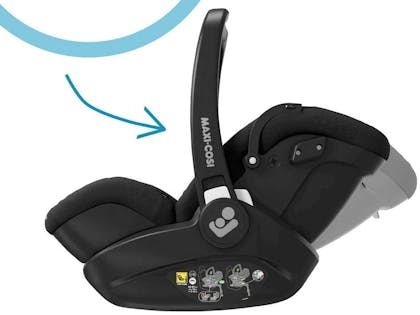
5. Maxi-Cosi Marble
*The latest from-birth car seat by Maxi Cosi
*ISOFIX base included
*There’s a large, integrated adjustable sun canopy
This Maxi Cosi car seat offers maximum body support and breathability. It may seem pricier than others, but takes safety to the next level with its enhanced safety features.
It's designed with added side impact protection thanks to a large energy-absorbing layer for added peace of mind for parents in event of a car crash.
There’s a thickly padded newborn insert so even the tiniest of babies can travel in safety and comfort and it's made to accommodate children up to around 13kg (roughly 12-15 months old).
The Maxi Cosi Marble conforms to the latest i-Size safety regulations, which promotes rear facing travel and enhanced side impact protection. It comes in several colours including sleek black and on-trend grey.
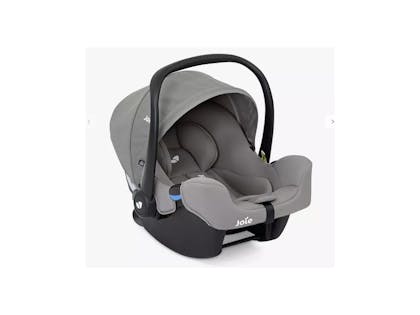
6. Joie i-Snug, £99
*Suitable from birth to around 15 months
*Has seven recline positions
*Weighs an incredibly light 3.25kg
This newborn car seat from the popular and affordable baby brand still has great features despite its purse-friendly price.
It's very lightweight, but still packs in sturdy impact protection with the exclusive Tri-Protect™ headrest and has three layers of protection inside the side wings and infant pillow.
It also has a curved base so you can rock your little one to sleep (when used out of the car) plus a comfortable insert to help support newborns.
How much should I spend on a newborn car seat?
Car seats for babies cover a huge price range.
At the bottom end, it’s possible to buy a basic car seat for as little as £40, although you won’t get fancy features at this price.
Most car seats that are suitable from birth cost around the £100 to £200 mark.
Car seats that have ISOFIX (where you can connect the car seat directly to your car’s chassis) fitting tend to be more expensive than those without, and you might also need to buy a separate base for around £70 to £100.
Generally, the more you spend, the safer the car seat, with the most secure and luxurious costing up to £700.
Key features to look for in a newborn car seat
All babies must travel in a rear-facing car seat until they are around 12-15kg or aged around 15 months.
Try and choose an i-Size car seat if possible.
iSize car seats have to be tested for side impacts, as well as front and rear, and will have to be secured using ISOFIX.
Children have to travel rear facing until 15 months, and seats are sold by height, not weight.
i-Size car seats are worth considering if safety is your biggest priority.
Other features to look for in a newborn car seat
Car seats for newborns have a three-point harness, with straps that go over your baby’s shoulders and between his legs and buckle in front, or a five-point harness, which has additional waist straps for extra safety.
Pads that slip onto the straps and behind the seat buckle will make him more comfy.
Look for a snug, padded seat for comfort and security; many come with a head hugger cushion and an insert for the seat to give a better fit for tiny babies.
Other features to look for in a newborn car seat include removable, washable covers, a carry handle that can be secured in different positions, indicators to show whether the seat is correctly fitted, and a sun canopy.
An important thing to consider when choosing a car seat is how it will fit into your car.
Some are secured in place using the adult seatbelt. These tend to be cheaper and can be used in a wider range of cars, but can be fiddly to fit.
Other seats have a base (often sold separately) which is secured with the seatbelt, and the seat itself then clips onto the base.
This makes fitting easier, but you’ll need to move the base if you’re travelling in a different car.
ISOFIX seats fix onto special tether points that are built into the car.
All cars made since 2006 have to have at least one ISOFIX-enabled seat, but older cars may not have them.
ISOFIX seats are easier to fit correctly and offer better protection than seatbelt-secured seats in a crash.
Some car seats have ISOFIX connectors on the seat itself; others need a separate base.
Other things you need to know about newborn car seats
If you plan on using your Group 0+ as part of a travel system, make sure that’s compatible with your chosen pushchair. You might have to buy special adapters.
The safest place for your baby to travel is in the back seat of the car.
If you have to fit their car seat on the front passenger seat, it’s essential that you disable the airbag, as this can cause serious, and even fatal, injuries if it inflates in a crash.
It’s also recommended that babies aren’t left in a car seat (including a car seat on a travel system) for more than two hours, to avoid damaging their developing spine.
There are now lie-flat car seats which solve this issue, see our round-up here.
Read on:
• Why you need to get rid of your backless booster seat
• Extended rear-facing car seats - the facts
